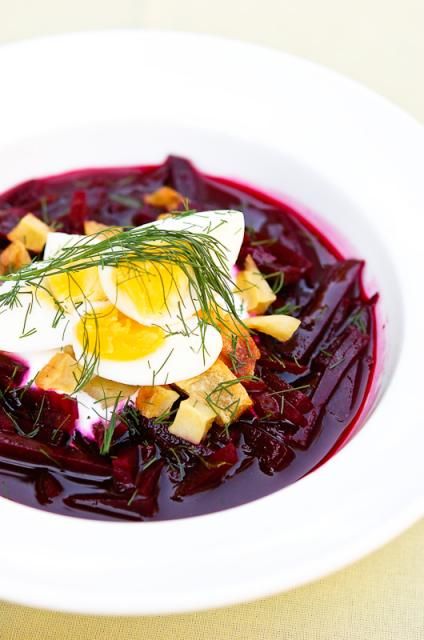
Photo by Flickr user Danielle Tsi.
The fate of borscht, the purple beet-based soup, seems inextricably tied to the fate of the Catskills. Both the soup and the region had their glory days in the 1950s, when the term "Borscht Belt" sounded glamorous, thanks to the massive Jewish resorts that attracted luminaries and beet-lovers alike upstate.
But now, the Wall Street Journal reported in an article yesterday, borscht is in decline:
"Summer used to be borscht season," says Mr. Gold, chief executive of Gold Pure Food Products Co., based here. Several times a week, he recalls, "we would ship it in trailers—40- to 52-foot-trailers" each packed with 1,000 cases of bottled borscht headed to supermarkets.
In the 1950s, ads for the stuff featured a jar outfitted with a beret and sunglasses. "Be a Beet-Nik…Get Cool, Man!"
These days, the borscht business is beat. Mr. Gold recently watched as one of his workers loaded a truck with just 360 cases of his 79-year-old family company's recipe. Mark Dewey, whose Dewey Produce Inc. in Byron, N.Y., grew beets for nearly all the borscht makers in the Northeast, says his shipments to borscht producers have dropped to just 200 tons a year, down from 1,750 tons a year in borscht's heyday.
But maybe borscht can jump on the national enthusiasm for 1950s foods (think deviled eggs and cupcakes) and rocket back to popularity. The Golds are giving it a try:
Is it the packaging? The jar with the big Gold label has stayed basically the same since the Golds started making borscht in 1947, barring some tinkering here and there. Howard Gold is partial to the classic container—it provides continuity, he says. His cousin Steven doesn't like it.
"It needs a totally new look to it," Steven Gold declares. "A sexy look." He advocates taking the word "borscht" out of the equation altogether. Call the product "Beet Smoothie," he suggests. "Power Beet Juice," offers Howard Gold. How about "Organic Borscht" to capture consumers devoted to natural foods?













